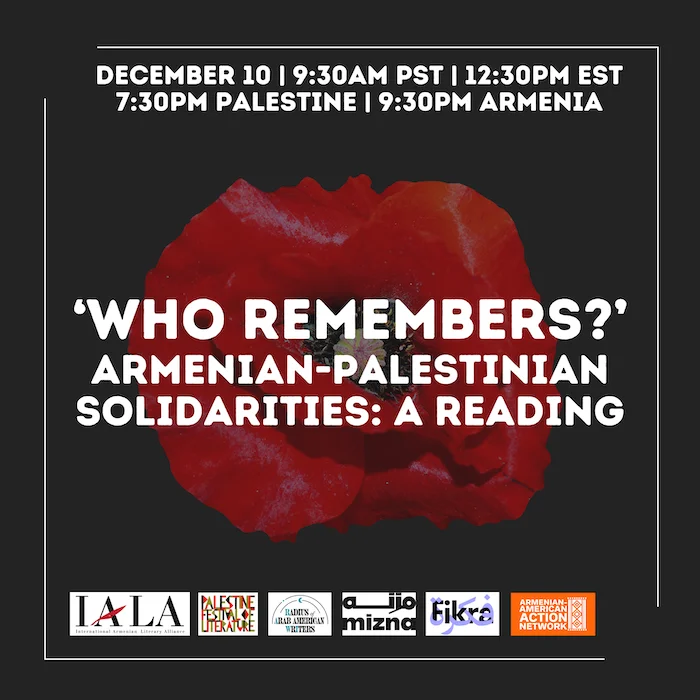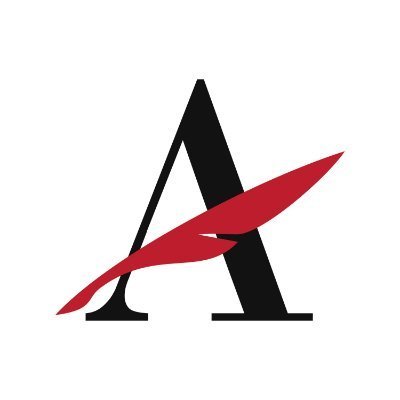
The International Armenian Literary Alliance (IALA), Armenian-American Action Network, Fikra Magazine, Mizna, the Palestine Festival of Literature (PalFest), the Radius of Arab American Writers (RAWI) and Writers Against the War on Gaza (WAWOG) invite you to join us for a virtual reading on December 10, “Who Remembers?”: Armenian-Palestinian Solidarities. Register here.
This reading convenes Armenian and Palestinian writers to denounce the normalization of genocidal violence, in solidarity with those under siege in Gaza. Through the reading of poems, fiction and personal essays, this event will address interlocking historical injustices affecting Palestinians and Armenians. It’s staged in opposition to Islamophobia, anti-Arab racism, antisemitism and anti-Armenian racism, in recognition that there can be no justice until all are free.
Palestinians in Gaza and the occupied West Bank are now witnessing the escalation of an ongoing campaign of genocidal violence. As of November 26, that campaign has killed more than 14,000 Palestinians, over 5,000 of them children. Hospitals, schools and refugee camps have been regular targets of continuous bombardment. Thousands have been forcibly displaced from northern Gaza in what has been described as the repetition of the 1948 Nakba, or Catastrophe.
Six weeks earlier, more than 100,000 Indigenous Armenians were bombarded and forcibly displaced from the Republic of Artsakh in an act of ethnic cleansing, after enduring nine months of blockade and what a former ICC prosecutor termed “genocide by starvation.” Their mass deportation along the Lachin Corridor raised the specter of the 1915 Armenian Genocide — the Mets Yeghern, or Great Crime.
In the efforts to free Palestine, to liberate Artsakh and across liberation struggles, poets and writers have borne witness, remembered and demanded justice.
This reading is co-hosted by the International Armenian Literary Alliance, the Armenian-American Action Network, Fikra Magazine, Mizna, the Palestine Festival of Literature (PalFest), the Radius of Arab American Writers (RAWI) and Writers Against the War on Gaza (WAWOG).
The reading will take place via Zoom on December 10 at 9:30 a.m. PST / 11:30 a.m. CST / 12:30 p.m. EST / 7:30 p.m. Palestine / 9:30 p.m. Armenia. It will also serve as a fundraiser for Palestine Legal and for All for Armenia.
Readers and Co-Organizers:
Nancy Agabian (Co-Organizer)
Nancy Agabian is a writer, teacher and literary organizer, working in the spaces between race, ethnicity, cultural identity, feminism and queer identity. Her recent novel The Fear of Large and Small Nations was a finalist for the PEN/Bellwether Prize for Socially-Engaged Fiction. She is the author of Me as her again: True Stories of an Armenian Daughter (Aunt Lute Books, 2008), a memoir that was honored as a Lambda Literary Award finalist for LGBT Nonfiction and shortlisted for a William Saroyan International Writing Prize, and Princess Freak (Beyond Baroque Books, 2000), a collection of poetry and performance texts.
Mashinka Firunts Hakopian (Co-Organizer)
Mashinka Firunts Hakopian is an Armenian-born writer, artist and researcher residing in Glendale, CA. She was a 2021 visiting Mellon Professor of the Practice at Occidental College in the Department of Art and Art History. She holds a Ph.D. in the History of Art from the University of Pennsylvania. Her book, The Institute for Other Intelligences, was released by X Artists’ Books in 2022. Her writing and commentary have appeared in the Los Angeles Review of Books, Los Angeles Times, Meghan Markle’s Archetypes, AI & Society and in the UT Press collection, We Are All Armenian: Voices from the Diaspora.
Sophia Armen
Sophia Armen is a community organizer and writer, born and raised in Los Angeles. She is the Co-Director of Armenian-American Action Network and The Feminist Front. Her work has appeared in The Los Angeles Times, Armenian Weekly, The Electronic Intifada and in We Are All Armenian: Voices from the Diaspora, an anthology of essays with University of Texas Press. She is a descendant of genocide survivors from Kharpert, Hadjin, Istanbul and Van.
Nancy Kricorian
Nancy Kricorian is the author of the novels Zabelle, Dreams of Bread and Fire and All the Light There Was. Her essays and poems have appeared in The Los Angeles Review of Books Quarterly, Guernica, Parnassus, Minnesota Review, The Mississippi Review and other journals. She has taught at Barnard, Columbia, Rutgers, Yale and New York University, as well as for Teacher & Writers Collaborative in the New York City Public Schools. She participated in the 2010 Palestine Festival of Literature and taught at the Palestine Writing Workshop in Birzeit in 2011. Her new novel about Armenians in Beirut during the Lebanese Civil War will be published by Red Hen Press in 2025.
Micaela Kaibni Raen
Micaela Kaibni Raen is a Palestinian American queer femme-dyke, mother, multi-genre writer, visual artist and activist. She grew up in the Little Arabia community in California and graduated from Chapman University. During that time, she became a member of the Radius of Arab American Writers, Inc., ACT UP! and Queer Nation. She has been a community organizer for over 35 years in North America and is committed to international human rights, especially that of Indigenous and displaced peoples, women, LGBTIQ communities and those affected by HIV+/AIDS. Her work appears in Bint el Nas, Mizna, Koukash Review, Rowayat Literary Journal, Yellow Medicine Review, The Poetry of Arab Women, A Different Path, El Ghourabaa: A Queer and Trans Arab and Arabophone Anthology, and Ask the Night for a Dream: Palestinian Writing from the Diaspora.
Mai Serhan
Mai Serhan is Palestinian-Egyptian writer, editor and translator. She earned her M.A. in Arabic Literature from the American University in Cairo and an M.St. in Creative Writing from the University of Oxford. An extract from her forthcoming memoir, Return is a Thing of Amber, was a finalist for the Narratively Memoir Prize and her poetry collection, CAIRO: the undelivered letters, won her the Centre for Book Arts Poetry Chapbook Award 2022. Visit www.maiserhan.com to find more on Mai’s work.
About the Co-Sponsors:
International Armenian Literary Alliance
The International Armenian Literary Alliance supports and celebrates writers by fostering the development and distribution of Armenian literature in the English language. While the majority of IALA’s members are of Armenian descent, our community encompasses people from all over the world who speak many languages. We focus on literature in the English language because of its global reach, but our aim is to operate beyond any linguistic barriers. https://armenianliterary.org/
Armenian-American Action Network
Armenian-American Action Network is an advocacy and research organization fighting anti-Armenian racism, teaching Armenian-American history and forwarding civil rights, immigrant rights and refugee rights for Armenian and all communities in the United States. Founded in 2021, we fight and document instances of anti-Armenian discrimination and work for representation, equity and power for the Armenian-American community. https://armenianamericanactionnetwork.org
Fikra
Fikra is an online Palestinian literary magazine founded in 2022. We publish essays, short stories, poetry and visual art in both Arabic and English. Fikra Magazine is a platform for Palestinians and by Palestinians. We don’t accept funding from governments or politically affiliated donors to ensure complete editorial independence. https://fikra-magazine.com
Mizna
Mizna is a critical platform for contemporary literature, film, art and cultural production centering the work of Arab and Southwest Asian and North African artists. For more than twenty years, we have been creating a decolonized cultural space to reflect the expansiveness of our community and to foster exchange, examine ideas and engage audiences in meaningful art. https://mizna.org/
Palestine Festival of Literature (Palfest)
The Palestine Festival of Literature (PalFest) is a cultural initiative committed to the creation of language and ideas for combating colonialism in the 21st century.The festival was created as an act of cultural solidarity with Palestine by a group of international cultural figures brought together by Founding Chair, Ahdaf Soueif, in 2008. Since then PalFest has run an annual festival in which international authors combine with their Palestinian counterparts for free, public events in cities across Palestine. https://www.palfest.org/
Radius of Arab American Writers (RAWI)
RAWI (Radius of Arab American Writers) is a national organization that provides mentoring, community and support for Arab American writers and those with roots in the Arabic speaking world and the diaspora. It stands for The Radius of Arab American Writers and its acronym, RAWI, means “storyteller” in Arabic. https://www.arabamericanwriters.org
Writers Against the War on Gaza (WAWOG)
Writers Against the War on Gaza (WAWOG) is an ad hoc coalition committed to solidarity and the horizon of liberation for the Palestinian people. Drawing together writers, editors, and other culture workers, WAWOG hopes to provide ongoing infrastructure for cultural organizing in response to the war. This project is modeled on American Writers Against the Vietnam War, an organization founded in 1965. https://www.writersagainstthewarongaza.com
About the Organizations We are Fundraising For: Palestine Legal and All For Armenia
Palestine Legal
The mission of Palestine Legal is to bolster the Palestine solidarity movement by challenging efforts to threaten, harass and legally bully activists into silence and inaction. The organization provides legal advice, Know Your Rights trainings, advocacy and litigation support to college students, grassroots activists and affected communities who stand for justice in Palestine. Palestine Legal also monitors incidents of suppression to expose trends in tactics to silence Palestine activism. https://palestinelegal.org/
All for Armenia
All for Armenia is guided by the values of humanitarianism, respect, transparency, compassion, and hope. Since the start of the 2020 Artsakh War, we have provided nutrition, warm clothing and hygiene products for the refugee families of Artsakh. As of November 10, 2020, most of these families are refugees indefinitely. Our mission has evolved into a long-term, sustainable form of aid for not only these families, but their communities at large that extends beyond basic needs.
https://allforarmenia.org



Armenians shouldn’t be that naive to support this. What Armenian-Palestinian solidarity? Some foolish Armenians support the so called Palestinian suffering. Disguised suffering. For example, in this article, it states that Palestinians in Gaza and the occupied West Bank are now witnessing the escalation of an ongoing campaign of genocidal violence. Why they don’t say that Palestinians started it, by invading Israel on October 7 and killed, raped and took hostages innocent civilians? Israel, like any civilized society under attack has the right to respond to terrorism. A stand supported by the USA, EU and the majority of civilized countries. With the exception of Muslim countries. Like, for example, Turkey, a staunch supporter of terrorist Hamas, whose leaders live in Turkey.
To compare Israel with Azerbaijan is not correct. Israel is like Armenia. A small country surrounded by enemies. Just like Armenia is surrounded by 100 million Turks who want to see its destruction, Israel is surrounded by 500 million Arabs, Iranians and Turks who want to see its destruction.
The fate of Israel and Armenia depends on the will of their people to fight against much more powerful enemies. Fortunately for Israel, they have a more powerful army and a diaspora which supports the mother country.
In the case of Armenia, a small land locked country, the diaspora is not even united. The correct position of Armenians is to stand with Israel, which also fights the common enemy, Turkey and Islamic terrorism.